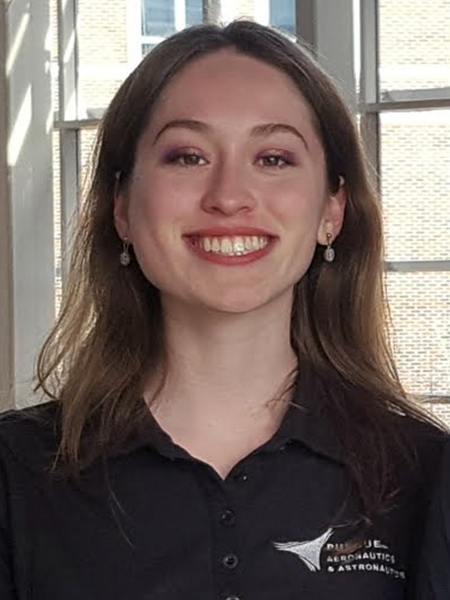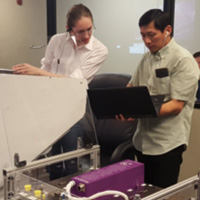AAE student cherishes 'amazing' opportunity as Matthew Isakowitz Fellow

Sydney Dolan had pinch-me moments seemingly daily this summer.
She was riding a 12-week paid internship at NanoRacks, a private company that develops products for the commercial utilization of space, at its Houston office; was connected with a mentor within that company as well as an external mentor, who happened to be a CEO of another commercial space company; and was doing “quite literally everything” on the project she was assigned day-to-day. A project of which her exact design is projected to launch in November on a SpaceX Commercial Resupply Services mission.
Then, to cap the 12-week experience, she was shuttled off to California for a two-day summit that found her in the same room as SpaceX President and Chief Operating Officer Gwynne Shotwell.
“I would look at her from, like, half a mile away and have been pleased,” Dolan says with a laugh. “Being able to sit in a room and have her want to talk with me, that’s unbelievable.”
The Matthew Isakowitz Fellowship Program certainly offered prime opportunity and networking for Dolan, who recently began her senior year in AAE.
She was one of 24 individuals – and one of only six women – selected in the inaugural class. The fellowship currently is accepting applications for Year 2 from college juniors, seniors, and graduate students with a deadline of Nov. 30. Dolan has been encouraging fellow Boilermakers to apply.
“It’s a really good opportunity,” Dolan says. “They have access to a lot of the start-up companies, and it’s hard to get your foot in the door. You really have to know someone to work at a start-up. Also, the mentoring and networking is unbelievable. Gwynne Shotwell ... (and) being able to network with the president of Virgin Galactic. The head of business development at Blue Origin. These are the people who started commercial space. For them to invest in our potential, take one-on-one time with us, that’s a really good deal.”

As part of the application process, students need to write an essay. Dolan says she had a choice between two topics: “If you had $100 million to fund anything in space, what would you do?" or “If you could talk to the Vice President on the way to the Space Policy meeting, what would you recommend for policy?” She chose the latter.
The application also asked for preference on type of company and internship assignment, and though Dolan likely was a fit for several opportunities, she may have landed the perfect one with NanoRacks, a company that literally started in a garage but now has three locations and is considered a market leader in in-space services.
The pairing produced an interesting summer project.
NanoRacks had paired with Marvel Entertainment for the “Guardians of the Galaxy Space Station Challenge.” The contest focused on two characters from the Guardians series, Rocket and Groot, and asked 13-to-18-year-old students to submit innovative concepts to be tested in space, based on the attributes of those super heroes. The winning project for “Team Rocket” was an experiment to analyze the effectiveness in microgravity of a dental glue that is activated by UV light. Because soldering in microgravity results in weaker bonds due to air bubbles, the team said. So they’d be prepared in case Rocket, a raccoon, broke a tooth or lost a filling in space.
For Dolan, that meant building a NanoLab, a module that is 15x10x10 centimeters to house the science experiment for the winner, to test the effectiveness of dental fillers when they’re cured in space. Dolan was in charge of the full design for the project, as well as handling all project management and prototyping.
“It was amazing how much responsibility they gave me,” she says. “Also, the room to fail. Sometimes it’s a lot of pressure when you have to do everything right, but there was a lot of mentoring as well.”
Dolan enjoyed the project, especially because it brought her a “degree closer to Chris Evans,” who plays Captain America in the Marvel universe, she says with a laugh.
“It was a successful summer,” she says.
For many more reasons.
Dolan’s external mentor was Natalya Bailey, the CEO of Accion Systems, with whom Dolan would email every few weeks with questions or “whatever crisis I had at the moment.” Bailey had advice – and also connections. Dolan was able to network with some of Bailey’s colleagues and people at MIT.
Accion Systems, based in Boston, develops advanced electric propulsion systems for small satellites. Its flagship product, TILE, uses proprietary electrospray thrusters, based off Bailey’s Ph.D. work at MIT.
“She’s incredibly smart, very calculated, just thinks everything through,” Dolan says. “She’s also, like, incredibly young. She’s in her 30s, has a company, has a husband, has a kid. She is doing it. It’s very inspirational to me to be able to connect with her.”
At the summit in L.A., Dolan and the rest of the fellows gathered to tour the Virgin Orbit, Boeing, Millennium Space Systems and SpaceX facilities nearby, attend panels led by venture capitalists and astropreneurs, network, participate in a business pitch competition.
“The fellowship was to honor the memory of Matthew Isakowitz, a thoughtful young engineer whose passion for space was only rivaled by his kindness toward others,” Dolan says. “This is an amazing opportunity, but I also want to emphasize that it’s to support future young people that carry the same passion for commercial space that he did. I was certainly intimidated by the caliber of other fellows and the industry professionals and uncertain as to how I would fit in, but I learned that the underlying message of the program is to follow your heart and be compassionate toward others. That’s something anyone can practice.”
